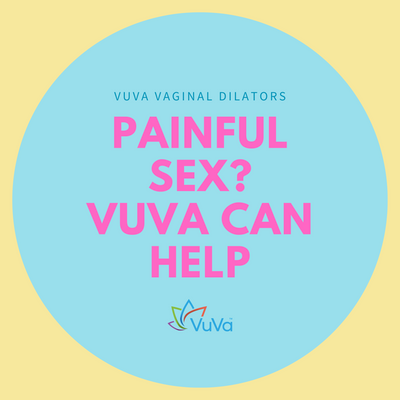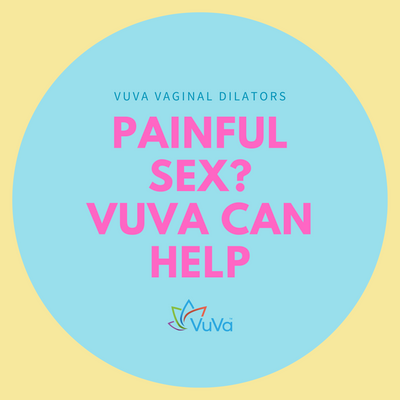
| Caroline Knight
How to Avoid Painful Sex: 5 Helpful Tips
If having pain during sex is new to you and haven’t yet done much research on the topic, you may not have heard of the medical name for it: dyspareunia. It refers to the varying presentations and degrees of pain that can occur during intercourse when something isn’t functioning as it should be. If this is you, you are no doubt wondering how to prevent painful sex. Fortunately there are various solutions available to restore or improve your sex life.
This article will cover the symptoms and causes of dyspareunia, and offer you five top tips for avoiding pain during sex…
Painful sex symptoms
What are the most common symptoms of painful sex? Firstly it’s worth noting that sexual pain symptoms are not always the same, since we have complex bodies. Sometimes underlying conditions can create dysfunction leading to pain. Often women with dyspareunia experience the most pain during penetration. Sexual pain can be felt deep inside the pelvic area. It may be most uncomfortable in the vagina, but can also occur in the bladder or urethra.
The pain may vary from aching or burning sensations to uncomfortable itching. It could be compared to the kind of stabbing or deep pains experienced during dysmenorrhea (period cramps).
Dyspareunia can occur at varying stages of sexual intercourse, but it most likely at penetration, during or after intercourse. For some, it only occurs when intercourse has finished. Others still may find that it only happens in certain situations, or with specific people.
Why do I feel pain during sex?
There are many possible reasons for dyspareunia. Causes of painful sex vary greatly, and it is not always easy to pinpoint the true reasons. It is sensible to examine some of the physical factors that may be behind it. The below list is a good place to start, but in the event that you are unable to find the cause of painful sex, you should consult a qualified healthcare practitioner for an official diagnosis. Your doctor will examine your medical history and perform a pelvic examination. It may be necessary to take a vaginal sample in case tests are required.
It’s possible that women who experience dyspareunia can also feel pain when inserting tampons or having gynecological examinations. Although it is more common in women, it’s also possible for men to have dyspareunia.
If you have pain during intercourse, firstly, you should determine whether you are experiencing outer or inner pain. This can be a good indicator of which underlying conditions could be responsible. Entry pain in the vagina or anus is classified as outer pain. Conditions that cause outer pain are:
Vulvodynia or vaginismus
Vulvodynia is a chronic vaginal pain condition, which itself has a variety of possible causes. It is characterized by a burning or stinging pain in the entrance of the vagina, and must have been present for over three months. For pain around the opening, the condition is called vulvar vestibulitis.
Vaginismus refers to involuntary muscle contractions and spasms in the vagina. Penetration can be painful, difficult and even impossible with this condition.
Both conditions can play havoc with a woman’s sex life since she is unable to relax due to the pain upon intercourse.
Vaginal dryness
If you are not properly lubricated during sex, this can lead to pain. Women who have had radiation treatment for cancer may struggle with this issue, as will women who have had their ovaries removed. That’s because estrogen levels will drop significantly or even totally. The same applies for women who have been through the menopause, which may lead to lack of libido and lessened frequency of intercourse. The latter is, for some, a causal factor in dyspareunia. Women who are on birth control may also be at risk.
Other factors affecting lubrication levels are breastfeeding, smoking, stress and excessive exercise. Finally, it’s important to make sure you are getting enough foreplay so that your body is ready for penetration.
Other causes of outer pain
It is possible that inflammation, infections, or skin disorders like lichen sclerosus, psoriasis or eczema are causing outer pain. A UTI (urinary tract infection), yeast infections, or an STD could also cause it. Another possibility (although rare) is congenital abnormality such as vaginal agenesis or a retroverted uterus.
There are also conditions that cause inner pain: that is, deep pain in the vagina or anus. Some of the more common possibilities are:
- Interstitial cystitis
- Endometriosis
- Ovarian cysts
- Pelvic inflammatory disease (PID)
- Irritable bowel syndrome (IBS)
- Damage or discomfort after giving birth
- Hemorrhoids
- Surgical or medical treatments impacting the vaginal wall or hormone levels
- A history of sexual or emotional abuse
- Stress
5 best ways to avoid painful sex
There are several things that can help with dyspareunia pain, from products to behaviors. Below are our five favorite painful sex remedies:
The Ohnut ring
The Ohnut ring is a little device that your partner can wear around the base of his penis. It acts as a soft buffer when you’re having sex, allowing control over the depth of penetration. It comes as a set of 4 linking rings, meaning that you can make adjustments for maximum comfort when necessary. Its soft design makes it feel like skin, and it’s very comfortable to wear for your partner.

Vaginal dilators
Vaginal dilators are small plastic or silicone devices with a range of benefits for women with sexual health problems. They are designed to stretch the vaginal capacity if needed, but they can also prepare a woman for penetration when this has been historically difficult. Some of the benefits of using vaginal dilators for dyspareunia are:
- Pain free penetration, tampon insertion or pelvic exams through pelvic floor muscle relaxation
- Post-surgery comfort for those with narrowing, shortening or scarring in the birth canal
- Prevention of adhesions/fibrosis after radiotherapy to the pelvic area
- A reduction of pelvic floor muscle tension (or vaginismus spasms)
- Psychological benefits (diminishing the negative anticipation around penetration)
Need Dilators? Visit the VuVa Dilator Store here

Pelvic Floor Physical Therapy
Pelvic floor physical therapy is a treatment to help address pain, weakness, and dysfunction in the pelvic floor muscles. The type of therapy you need will depend upon the different symptoms you’re experiencing. For example, some symptoms will require relaxing and lengthening of the muscles, while others may require strengthening the muscles. Find a pelvic floor physical therapist near you here.
CBD products
Our bodies contain natural chemical receptors, known as endocannabinoids, and these have a role in pain. Located in the brain, nervous system, and reproductive organs, they are part of the Endocannabinoid System (ECS), which reduces pain in the body a harm reduction system. Researchers have found evidence that the ECS has a vital role in pain and inflammation treatment and management. In 2014, they determined that 61% of pelvic pain sufferers who used cannabis benefited from symptom improvement. CBD products containing high amounts are able to reduce pain inflammation without the high associated with THC. VuVa does not recommend a specific brand of CBD products.
Open communication with your partner
As always, communication around sexual intercourse can only be helpful, although many undoubtedly find this to be a sensitive topic. However, if you want to avoid pain during sex, it is important to be sure your partner knows what hurts and what feels good. ‘Grinning and bearing it’ will not lead to intimacy and connection, which should be one of the main goals of sex.
Whether you discuss your pain in the moment or outside of the bedroom, your partner will surely be grateful for the information, as they will want you to enjoy yourself. Another good idea is to use extra lubrication if you’re experiencing any dryness, which could also be a contributor.
We hope you found our recommendations on how to avoid painful sex useful, and are happy to help with any product advice for this issue. Don’t forget to check out our blog, which is a library of information on women’s sexual health concerns. Thanks for reading!
Resources
Vuvatech.com/blogs/care/dilators-for-dyspareunia-home-treatment-for-painful-sex
Ncbi.nlm.nih.gov/pmc/articles/PMC5638059/
Pubmed.ncbi.nlm.nih.gov/20962696/
Do you need to order vaginal dilators so you can start your pelvic floor therapy process? Made in the USA. Visit www.vuvatech.com
VuVa Helpful Links:
How do Neodymium Vaginal Dilators work?
7 Reasons for a Tight Vagina and How to Loosen
How to Relax Vaginal Muscles, Vaginismus & Sex
Vaginal Stretching - Keeping in Shape with Dilators
Do Dilators Really Work? Yes, and They can Improve Your Sex Life!
Shop for VuVa Vaginal Dilators
Tara Langdale Schmidt is the inventor of the VuVa Dilator Company. She has pelvic floor dysfunction herself and wanted to create a dilator set that is made in America that women can trust. VuVatech has been in business since 2014 and has helped over 50,000 women all over the globe. She patented the Neodymium Vaginal Dilator, that is clinically proven to help with blood flow and nerve pain.















